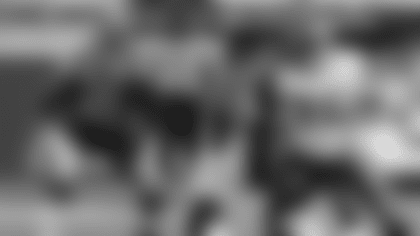Had the Seahawks not allowed a pair of fluky sacks last weekend—Russell Wilson had his foot stepped on by a lineman, and Trevone Boykin had the ball slip out of his hand on a pass attempt, a fumble he fell on for a loss—then Seattle would had their fourth game this season allowing one or fewer sacks.
As it stands, the Seahawks allowed only two sacks—and again, neither of those happened because someone was beaten in a one-on-one battle or missed an assignment—marking the fourth time in five games the Seahawks had allowed three or fewer sacks.
"You look at the number over the course of the season, we're a little better than maybe we thought, comparing to our standards over the last four or five years," Seahawks coach Pete Carroll said. "We're working hard at it, last week was a really good indication. Guys were tight and connected and all of that. We need to continue to do that, what we're trying to find is that consistency so we can really count on it. The second half of (Week 16 against Arizona) and then this last week, our guys were really fit it together well, and I'm hoping we can continue to show that."
As Carroll points out when he says "comparing to our standard" the Seahawks aren't claiming to be the best pass-protecting team in the NFL—their 42 sacks allowed were the sixth most in the league—but it is worth pointing out that, for all the criticism hurled at Seattle's line this year, Russell Wilson was sacked at the lowest rate of his career during the 2016 season, and that was while playing with an injured knee and ankle for much of the season that limited his ability to escape pressure the way he usually can.
This season, Wilson was sacked 41 times on a career-high 546 pass attempts, or once every 13.3 passes. Last year Wilson was sacked once every 10.7 attempts, in 2014 it was once every 10.8, while in the Super Bowl-winning 2013 season Wilson was sacked at the highest rate in his career, once every 9.3 attempts. That number was 11.9 during Wilson's rookie season. For what that looks like from a raw numbers perspective, consider that in 2013, Wilson was sacked three more times than this year while attempting 139 fewer passes.
"They continue to step up to the challenge," Wilson said. "I think the offensive line is doing a great job right now and they gave me a lot of time last week. They blocked really well, and in the second half of the game before that they did a really good job. We have the right guys and I think that they're doing a tremendous job from left to right. Justin Britt is leading those guys in the center, he's been a tremendous player for us this year and his leadership. Those guys are really committed to continuing to study and learn and continue to develop. We got so many guys, and despite the youth, it's been a good thing because they've been able to play the tough games early in the year, in the middle of the year, and now it gives us a chance for those guys to really step up in the playoffs and do a great job, and to have no nerves and to play at a high level."
None of Seattle's coaches or linemen would try to convince you that they've been perfect, or anything close to it, throughout this season, but what can get lost at times is that this group has shown the ability to do some pretty good things when they do put it together, whether that shows up in the form of fewer sacks or in the stretch of four games in November and December when the Seahawks averaged 163.8 rushing yards-per-game and 6.1 yards-per-carry. Now the key is putting that all together when it matters most, starting with Saturday's Wild Card playoff game against the Detroit Lions.
"It's more consistency," offensive line coach Tom Cable said. "So passing things off, communication, all those things are much better. You want to keep capturing it. That's what we're chasing here, is that ability to go week to week and do that. Too many inconsistencies as we've gone through the last few weeks. A couple times we thought it worked out, then we had two bad halves. First half against L.A. and then the first half against Arizona. Other than that, not bad, but we're just trying to get more consistent."
Britt, who has emerged into a leader on the line despite being in only his third NFL season—and his first season playing center—likes the direction his line is headed in despite, and in some ways, because of the struggles they have gone through up to this point.
"You could kind of see it throughout the season," he said. "We're young, and unfortunately we had to make some mistakes to learn some lessons. But both (the left and right) sides are starting to work together really well now… It's not going to be perfect—we're striving for that—but we're picking up some really good momentum going into the playoffs."
Right tackle Garry Gilliam, another third-year player, sees this year's line doing things better in pass protection than he did the previous two years.
"This year compared to past years since I've been around this team, I think this is one of the better years for us as far as being on the same page, identifying blitzes, and targeting them the right way," Gilliam said. "Then after that it's just winning our one-on-one battles. But in terms of identifying things, this is the best year since I've been a part of it."
As for what it will take to get back to running the ball like they did during that productive stretch a month ago, Britt said. "We don't have to do more, we just have to be us and just keep having great practices, having great weeks of preparation and trusting the process, not making stuff up just because it's the playoffs."
And yes, Seattle's line has had its ups and downs in part because it is one of the youngest and least experienced in the NFL, but again, that wasn't part of a master plan to scrimp on the offensive line because the Seahawks don't value that position group. As general manager John Schneider said before the season, the salary cap means teams "have to (save) somewhere, and we're not in the business of letting damn good football players leave."
In fact, the Seahawks had the league's highest-paid offensive line as recently as 2013, but since that season they have invested in new contracts for, as Schneider describes it, some "damn good football players" such as Richard Sherman, Earl Thomas, Russell Wilson, Bobby Wagner, Doug Baldwin (twice), Michael Bennett (twice), Cliff Avril and K.J. Wright. Had the Seahawks not re-signed Avril and Wright late in the 2014 season, they might have another highly-paid veteran or two on their offensive line, but then they wouldn't have the two players who were two of the best players on their defense this season. If members of Seattle's current line develop into Pro-Bowl and All-Pro caliber players, Seattle will very likely spend more on that group going forward.
"It has just been the way the structure has come out, and we're trying to take advantage of the opportunities when we have them," Carroll said last week. "We've got a young group now and these guys are going to grow up with us and we're really excited about that. There's no question that this is the first year together with this group, and we have a chance to keep it pretty solid and hopefully we'll be able to do that. We'll reap the benefits of the continuity, and then their time (for contracts) will come. We'll deal with that as the time comes. It's not about spending money, it's about getting guys in the right spots and doing what you can do. We've never played guys because of how much money they make and we're not ever going to do that. We're going to play the guys that best suit us and fit us. There are illustrations of that throughout the years. These guys are all young, they're going to grow up. I'm hoping this is going to be an offensive line in the future that we're going to be really proud of and fired up to have."
And while the focus for Seattle's line is on finding its best possible level of play this week and beyond in the postseason, one plus side to a young group this year, as Carroll notes, is the chance for growth in the future. Britt is in his first season at center, left guard Mark Glowinski started only one game last year, right guard Germain Ifedi is a rookie, and rookie left tackle George Fant is a former college basketball player who barely saw the field in his one season of college football.
"This is a young bunch of guys," Carroll said. "We got two first-time starters ever, another guy started once in his life before. That's about as young as you can get. All of the growth is going to be huge between year one and year two. I can't even imagine how much George Fant is going to see it differently when he looks at his second season when he comes back around. I feel and the coaches feel like we have a really good group for the future. We're young, they're hungry, they're bright, they're working at it and they're going through tremendous experiences and they're going to be measurably better when we come back around. I think this is a line for the future. We'll continue to make it as competitive as we can as we go forward, but this is a good place to start for us. Now that the season is over, OK we made it through, here we go, let's see how we handle the playoffs and then we'll just keep growing."





